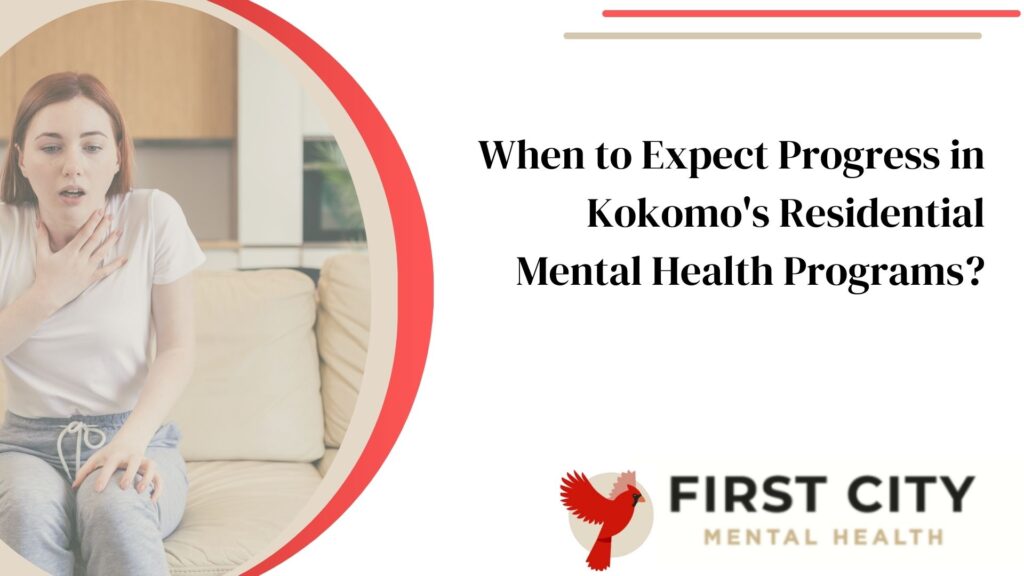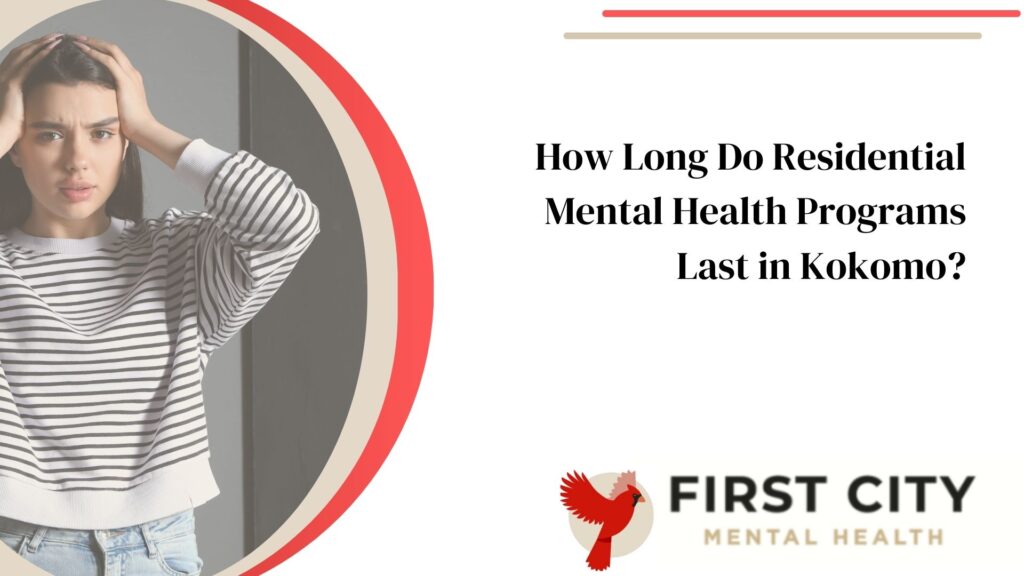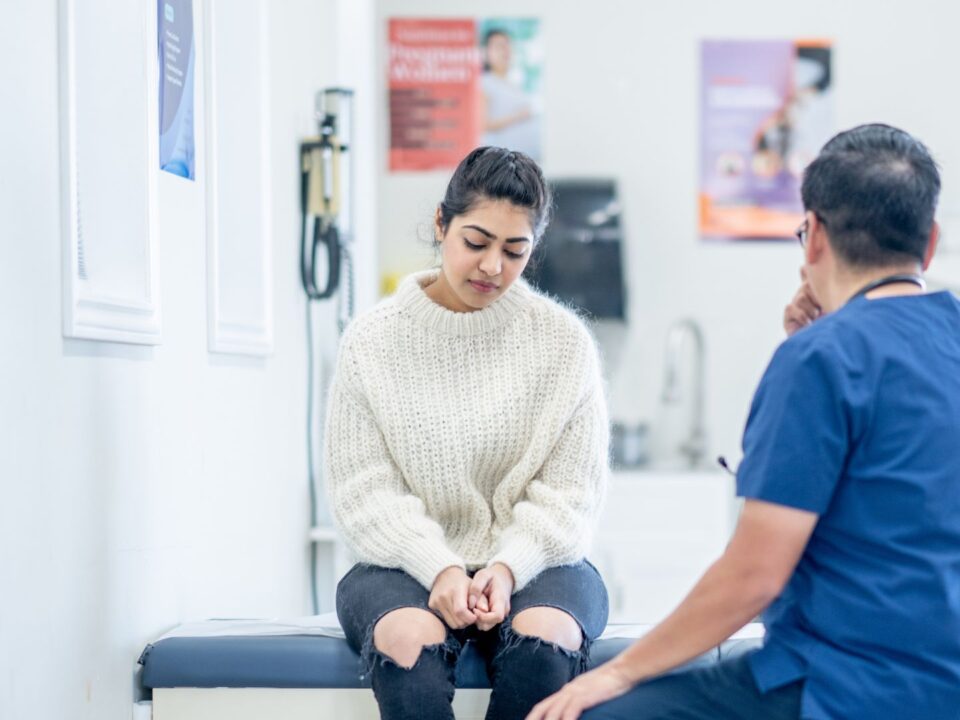
What is Residential Mental Health Treatment?
August 11, 2025
When to Consider Residential Mental Health Treatment in Kokomo?
August 15, 2025Are you or a loved one grappling with mental health issues and wondering how residential mental health programs can help? Residential treatment centers in Kokomo offer structured environments where individuals can receive intensive support to manage their conditions.
These facilities provide both medical and therapeutic care, addressing various mental health disorders like depression, anxiety, bipolar disorder, PTSD, and more.
One key aspect of residential mental health programs is their personalized approach to therapy. Each individual receives a tailored treatment plan designed by experts to meet specific needs for adequate recovery.
This blog post will explain what happens in these programs, the types of treatments offered, and how they aim to foster long-term healing. Keep reading to discover how Kokomo’s residential mental health programs could be the solution you’re seeking!
Key Takeaways
- Customized Treatment Plans: Each resident in Kokomo’s mental health programs gets a personalized treatment plan designed by experts to meet their needs.
- Range of Therapies: Programs offer evidence-based therapies like cognitive-behavioral therapy (CBT), dialectical behavior therapy (DBT), motivational interviewing, and therapeutic activities such as yoga and mindfulness.
- Comprehensive Support Services: To aid in long-term recovery, residents benefit from one-on-one therapy, group sessions, family counseling, and life skills training.
What Happens in Residential Mental Health Programs in Kokomo?
In Kokomo, residential mental health programs offer a supportive environment that feels like home. Residents engage in daily professional mental health treatment designed to improve their well-being.
Activities include therapy sessions, medication management, and skill-building exercises to enhance self-esteem and develop healthy relationships.
Residents also receive treatment for any co-occurring addictions or substance abuse issues. This comprehensive approach ensures holistic care through individual therapy plans tailored to each person’s needs.
The goal is to provide immediate relief and sustained recovery with long-term benefits in mental health residential in Kokomo.
When to Expect Progress in Kokomo’s Residential Mental Health Programs?

Progress in residential mental health Kokomo programs usually starts within the first few weeks. The intensive treatment and personalized treatment plans provided address various mental health conditions, such as anxiety disorders, depression, mood disorders, and substance use disorders.
Therapy sessions often include evidence-based treatments like cognitive-behavioral therapy (CBT) and dialectical behavior therapy (DBT), which can help residents begin seeing improvements in their symptoms.
Many facilities require a minimum commitment of 30 days to be clean and sober for admission to ensure a stable foundation for recovery. Southcoast Behavioral Health reports that outcomes vary with the severity of the condition but notes initial progress is typically visible around five to seven days into inpatient programs.
For those struggling with more complex issues like borderline personality disorder or post-traumatic stress disorder, steady advancements may take longer but remain achievable with consistent support from the clinical team.
What Support Services Are Available in Kokomo’s Residential Programs?
Kokomo’s residential treatment programs offer support services tailored to diverse backgrounds and needs. Patients receive comprehensive psychiatric care, including one-on-one therapy sessions to address mental health residential treatment concerns such as eating disorders, personality disorders, and substance abuse disorders.
Group therapy is another crucial component that allows individuals to share experiences and build peer support networks.
Family therapy sessions help strengthen relationships and involve loved ones in recovery. Life skills training teaches practical abilities necessary for independent living after leaving the facility.
In addition to therapeutic services, residents benefit from round-the-clock emotional support from trained staff members who assist in managing crises and maintaining stability during treatment.
How Long Do Residential Mental Health Programs Last in Kokomo?

The length of residential mental health in Indiana varies according to individual needs and the type of treatment required. Some programs typically last 21+ days.
Daily schedules in these residential treatment facilities often involve six to eight hours of therapy five to six days a week. The goal is to provide comprehensive treatment that addresses various facets of mental illness, such as post-traumatic stress disorder or obsessive-compulsive disorder.
Different durations help cater specifically to teens and young adults struggling with serious mental illnesses or addiction services.
How Therapy is Conducted in Kokomo’s Residential Mental Health Programs?
Therapy in Kokomo’s mental health residential Indiana programs involves both individual psychotherapy and group therapy sessions. Programs like Southcoast Behavioral Health rely on evidence-based treatments such as motivational interviewing, dialectical behavior therapy, and cognitive-behavioral therapy.
Residents can expect to participate in 6 to 8 hours of therapy daily, five to six days a week.
Some facilities also offer experiential modalities like yoga and mindfulness therapy, similar to what Brook Recovery Center provides. These activities help improve mental well-being alongside traditional psychiatric services.
Let’s explore the treatments available in Kokomo’s residential mental health programs.
What Treatments Are Offered in Kokomo’s Residential Mental Health Programs?
Kokomo’s residential mental health treatment programs offer a range of evidence-based treatments designed to address various psychiatric illnesses and conditions. Individual psychotherapy is a core component, allowing patients to work one-on-one with therapists.
Group therapy provides a supportive environment where participants can share experiences and coping strategies. Vocational counseling helps residents rebuild life skills necessary for integration into society.
We incorporate cognitive behavioral therapy (CBT), dialectical behavior therapy (DBT), and motivational interviewing. For more advanced interventions, the First City Mental Health Center offers options like ketamine infusions, transcranial magnetic stimulation (TMS), and electroconvulsive therapy (ECT).
Psyclarity Health focuses on trauma-informed therapies that are particularly effective for individuals dealing with substance abuse and co-occurring mental health disorders. Each program tailors its approaches to meet the unique needs of its residents, ensuring comprehensive care.
How to Get Admitted to a Residential Mental Health Program in Kokomo?
Getting admitted to a residential treatment for mental health program in Kokomo involves several steps.
Here is a simple guide to help you through the process:
- Research Programs: Research different residential mental health facilities in Kokomo. Compare each facility’s requirements, services offered, and treatment approaches.
- Contact the Facilities: Contact programs like First City Mental Health for more details about their services and admission process.
- Complete Initial Assessments: Most facilities will require an initial assessment. This step helps determine if their programs are suitable for your needs.
- Verify Clean and Sober Requirements: Some centers require at least 30 days of sobriety before admission.
- Submit Necessary Documents: Prepare all required documents, such as medical records, psychiatric evaluations, and any referral letters the program needs.
- Insurance Verification: Check if your insurance covers residential mental health treatment. Confirm with the facility if they accept your insurance plan.
- Schedule an Interview: Many programs require you to attend an interview in person, via phone, or via video to discuss your specific needs and goals.
- Review Program Policies: Before deciding, understand all program policies, including duration of stay, rules, and daily schedules.
- Finalize Admission Dates: Once accepted, coordinate with the facility to set your admission date and prepare for your stay.
- Prepare Logistically: Pack necessary items as the facility advises and arrange transportation to ensure a smooth transition into the program.
What Are the Goals of Residential Mental Health Programs in Kokomo?
Residential mental health facilities and programs in Kokomo aim to help residents build self-esteem, develop relationships, and improve life skills. Programs incorporate evidence-based treatment techniques for conditions like post-traumatic stress disorder (PTSD) and obsessive-compulsive disorder (OCD).
Farm-based or work-based residential programs teach new skills while fostering supportive connections.
These facilities provide trauma-informed therapies addressing substance abuse and co-occurring mental health issues. Advanced treatments such as ketamine therapy, transcranial magnetic stimulation (TMS), and electroconvulsive therapy (ECT) are also available.
The goal is an integrative, holistic approach that enhances overall well-being by comprehensively assessing each individual’s needs.
Conclusion
Kokomo’s residential mental health facility offers comprehensive support for various mental health issues. They use evidence-based treatments to ensure adequate recovery and healing.
Programs are designed to foster long-term success with sophisticated care plans crafted by experts.
Support services include therapy groups, medical detox, and inpatient rehabilitation.
Admittance typically involves an assessment by a treatment team to create personalized care paths.
FAQs
1. What are residential mental health programs in Kokomo?
Residential mental health programs in Kokomo provide intensive treatment services for conditions like post-traumatic stress disorder and obsessive-compulsive disorder.
2. How do residential treatment facilities help with self-harm?
These facilities offer evidence-based treatments and therapy groups to address self-harm behaviors and improve overall treatment outcomes.
3. Can outpatient treatment be part of a residential program?
Some residential care plans include integrated treatment options combining inpatient hospitalization with outpatient therapy programs.
4. What types of therapies are used in therapeutic boarding schools?
Therapeutic boarding schools use various therapy programs, including group sessions and individual counseling, to support students’ mental health needs within a structured community.
5. Who makes up the treatment team at a residential facility?
The treatment team usually includes therapists, doctors, and other healthcare professionals who work together to create personalized care plans for each resident.






